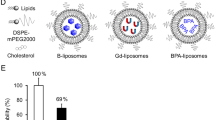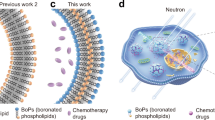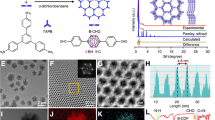Abstract
An immunoliposome containing a 10B-compound has been examined as a selective drug delivery system in boron neutron-capture therapy. Liposomes, conjugated with monoclonal antibodies specific for carcinoembryonic antigen (CEA) were shown to bind selectively to cells bearing CEA on their surface. The immunoliposomes attached to tumour cells suppressed growth in vitro upon thermal neutron irradiation and suppression was dependent upon the concentration of the 10B-compound in the liposomes and on the density of antibody conjugated to the liposomes. The results suggest that immunoliposomes containing the 10B-compound could act as a selective and efficient carrier of 10B atoms to target tumour cells in boron neutron-capture therapy.
This is a preview of subscription content, access via your institution
Access options
Subscribe to this journal
Receive 24 print issues and online access
$259.00 per year
only $10.79 per issue
Buy this article
- Purchase on Springer Link
- Instant access to full article PDF
Prices may be subject to local taxes which are calculated during checkout
Similar content being viewed by others
Author information
Authors and Affiliations
Rights and permissions
About this article
Cite this article
Yanagië, H., Tomita, T., Kobayashi, H. et al. Application of boronated anti-CEA immunoliposome to tumour cell growth inhibition in in vitro boron neutron capture therapy model. Br J Cancer 63, 522–526 (1991). https://doi.org/10.1038/bjc.1991.124
Issue Date:
DOI: https://doi.org/10.1038/bjc.1991.124
This article is cited by
-
Boron delivery agents for neutron capture therapy of cancer
Cancer Communications (2018)
-
PEGylated liposomes prepared with polyborane instead of cholesterol for BNCT: characteristics and biodistribution evaluation
Colloid and Polymer Science (2016)
-
In vivo evaluation of neutron capture therapy effectivity using calcium phosphate-based nanoparticles as Gd-DTPA delivery agent
Journal of Cancer Research and Clinical Oncology (2016)
-
Nuclisome—targeting the tumor cell nucleus
Tumor Biology (2012)
-
A critical assessment of boron target compounds for boron neutron capture therapy
Journal of Neuro-oncology (2003)



